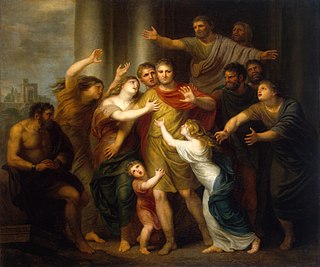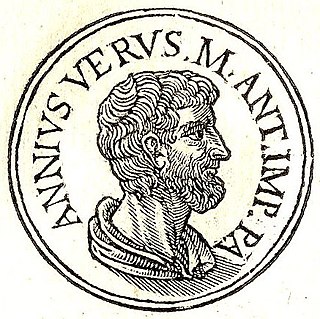Related Research Articles

Marcus Aurelius Antoninus was Roman emperor from 161 to 180 and a Stoic philosopher. He was a member of the Nerva–Antonine dynasty, the last of the rulers later known as the Five Good Emperors and the last emperor of the Pax Romana, an age of relative peace, calm, and stability for the Roman Empire lasting from 27 BC to 180 AD. He served as Roman consul in 140, 145, and 161.

The gens Atilia, sometimes written Atillia, was a plebeian family at ancient Rome, which rose to prominence at the beginning of the fourth century BC. The first member of this gens to attain the consulship was Marcus Atilius Regulus, in 335 BC. The Atilii continued to hold the highest offices of the state throughout the history of the Republic, and well into imperial times.

Annia Galeria Faustina the Elder, sometimes referred to as Faustina I or Faustina Major, was a Roman empress and wife of the Roman emperor Antoninus Pius. The emperor Marcus Aurelius was her nephew and later became her adopted son, along with Emperor Lucius Verus. She died early in the principate of Antoninus Pius, but continued to be prominently commemorated as a diva, posthumously playing a prominent symbolic role during his reign.

Herodes Atticus was an Athenian rhetorician, as well as a Roman senator. A great philanthropic magnate, he and his wife Appia Annia Regilla, for whose murder he was potentially responsible, commissioned many Athenian public works, several of which stand to the present day. He was one of the best-known figures of the Antonine Period, and taught rhetoric to the Roman emperors Marcus Aurelius and Lucius Verus, and was advanced to the consulship in 143. His full name as a Roman citizen was Lucius Vibullius Hipparchus Tiberius Claudius Atticus Herodes.
Marcus Appius Bradua, also known by his full name Marcus Atilius Metilius Bradua was a Roman politician who lived in the second half of the 1st century and the first half of the 2nd century in the Roman Empire.
Marcus Annius Verus was the paternal grandfather and adoptive father of the Roman Emperor Marcus Aurelius, and father-in-law of emperor Antoninus Pius.

Marcus Annius Verus Caesar was a son of Roman Emperor Marcus Aurelius and Empress Faustina the Younger. Annius was made caesar on 12 October 166 AD, alongside his brother Commodus, designating them co-heirs of the Roman Empire. Annius died on 10 September 169, at age seven, due to complications from a surgery to remove a tumor from under his ear. His death left Commodus as the sole heir.

Annia Cornificia Faustina Minor was a daughter of the Roman emperor Marcus Aurelius and his wife, Faustina the Younger. She was sister to Lucilla and Commodus. Her maternal grandparents were Antoninus Pius and Faustina the Elder, and her paternal grandparents were Domitia Lucilla and praetor Marcus Annius Verus. She was named in honor of her late paternal aunt Annia Cornificia Faustina.

Appia Annia Regilla, full name Appia Annia Regilla Atilia Caucidia Tertulla, was a wealthy, aristocratic and influential Roman woman, who was a distant relative of several Roman emperors and empresses. She was the wife of the prominent Greek Herodes Atticus.

Marcus Annius Verus was a distinguished Roman politician who lived in the 2nd century, served as a praetor and was the father of the Emperor Marcus Aurelius.

The gens Annia was a plebeian family at ancient Rome. Livy mentions a Lucius Annius, praetor of the Roman colony of Setia, in 340 BC, and other Annii are mentioned at Rome during this period. Members of this gens held various positions of authority from the time of the Second Punic War, and Titus Annius Luscus attained the consulship in 153 BC. In the second century AD, the Annii gained the Empire itself; Marcus Aurelius was descended from this family.
Appius Annius Trebonius Gallus, sometimes known as Appius Annius Gallus was a Roman senator and consul.

Atilia Caucidia Tertulla was an aristocratic woman from Ancient Roman society.

Tiberius Claudius Atticus Herodes was a Greek aristocrat of the Roman Empire. Born into a wealthy family, his father was proscribed by Domitian, had his fortune confiscated, and was exiled or executed. Claudius Atticus restored his family's influence, becoming a senator and suffect consul in 133. His son, Herodes Atticus, erected a statue of him at the Nymphaeum of Herodes Atticus in Olympia.
Publius Aelius Vibullius Rufus was a Greek aristocrat who lived in the 2nd century in the Roman period. He served as archon of Athens in 143–144.

Marcia Annia Claudia Alcia Athenais Gavidia Latiaria, otherwise most commonly known as Athenais (143-161) was a Roman noblewoman of Greek Athenian and Italian Roman descent who lived in the Roman Empire.
Athenais was a Roman noblewoman of Greek Athenian and Italian Roman descent. Athenais lived between the second half of the 2nd century and first half of the 3rd century in the Roman Empire.
Appia Annia Claudia Atilia Regilla Elpinice Agrippina Atria Polla otherwise most commonly known as Elpinice (142-165) was a Roman noblewoman of Greek Athenian and Italian Roman descent who lived in the Roman Empire.
Tiberius Claudius Marcus Appius Atilius Bradua Regillus Atticus, otherwise known as Atticus Bradua, was a Roman politician of Athenian and Italian descent who was consul ordinarius in 185 AD.
Tertulla is an Ancient Roman nickname for the female cognomen Tertia. Tertia in Latin means "the third daughter". Women with the name include:
References
- 1 2 3 4 Pomeroy, The murder of Regilla: a case of domestic violence in antiquity
- 1 2 3 Birley, The Roman government of Britain p. 114
- 1 2 3 4 Pomeroy, The murder of Regilla: a case of domestic violence in antiquity p. 14
- 1 2 3 Birley, The Roman government of Britain p. 112
- ↑ Birley, The Roman government of Britain p. 112-114
- ↑ Pomeroy, The murder of Regilla: a case of domestic violence in antiquity p.15
- 1 2 Birley, The Roman government of Britain p. 113-114